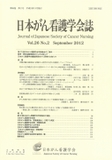Japanese
English
- 販売していません
- Abstract 文献概要
- 参考文献 Reference
- サイト内被引用 Cited by
要旨
本研究の目的は,化学療法を受ける再発白血病患者の有害事象への対処行動の構造を明らかにし,有害事象マネジメントがより効果的となる看護援助を検討することである.方法は,入院中の再発白血病患者7名に対して半構造化面接によるデータ収集を行い,グラウンデッド・セオリーに基づき分析した.
分析の結果,コアカテゴリー『無駄なエネルギーを消耗しない効率的な対処行動を身につけていく』を基盤に,4つの主要カテゴリー[経験と情報から必要な対処行動を見極める],[症状をコントロールしながらうまく付き合っていく],[緩急をつけて必要だと思う予防行動を継続する],[日々を乗り越える糧をもち治療を受け入れていく]が評価・フィードバックを繰り返して展開するプロセスとして構造化された.再発白血病患者は死と隣り合わせの状況で化学療法の完遂を目指すため,残りのエネルギーを枯渇させないよう洗練した経験をもとに情報を選定し,無駄なエネルギーを消耗しない効率的な対処行動を身につけていく必要性があった.医療者は,患者の経験から導かれる取り組みのありように関心を寄せ,情報の扱いや教育的関わりを個別に吟味することが重要となる.
Abstract
The purpose of this study is to clarify the structure of coping with chemotherapy-related adverse events in patients with relapsed leukemia and to examine the effective management of adverse events. This study using semi-structured interviews explored coping of seven hospitalized patients with relapsed leukemia. Data were analyzed using the grounded theory approach. The core category of the patient's coping process was "learning efficient coping without wasting energy". The coping process consisted of four main categories: 'Dealing with one's disease by controlling symptoms', 'Proper control of adverse events', 'Continue effective preventive measures', 'Accept treatment with will to live'
Patients with relapsed leukemia who aim to complete severe chemotherapy had to learn efficient coping behavior that doesn't waste energy to avoid exhaustion. Nurses need to understand the structure of coping which patients learned through their experience, and examine the manner of delivering information and educational intervention to patients.
Copyright © 2012, Japanese Society of Cancer Nursing All rights reserved.


